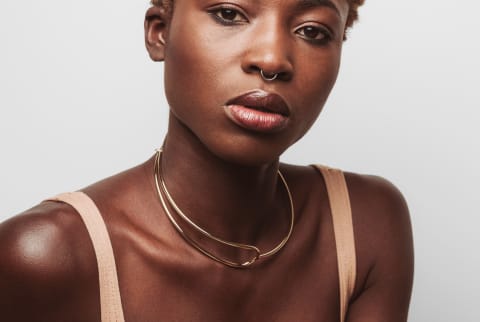The Surprising Truth About Sensitive Skin & How You May Be Causing It


Three years ago, I started developing redness on my cheeks, nose, and chin. Occasionally, I'd even get small stinging, itching patches around my eyes. What could be causing this? I wondered as I washed my face with a foaming cleanser and rotating face brush, applied an extra-strength glycolic acid serum twice daily, and used an enzyme peel three to four times a week.
I came to the conclusion I must have sensitive skin—that at some point in my 20s my skin changed from oily to reactive, and it was just the natural progression of things, outside of my control. Or during my time living in New York City, my skin just became more irritated (which is probably true). No, it couldn't possibly be that new 10-step routine I was trying. My theory was backed up by how commonly the skin type is self-reported: While it's a hard condition to study and poll, the number of women who claim to have it hovers around 50 percent1.
Advertisement
"A lot of women, and many of my patients, think they have sensitive skin even if they don't; it's an overdiagnosed term," says board-certified dermatologist Whitney Bowe, M.D., author of The Beauty of Dirty Skin.
Turns out, I had been triggering sensitivity with over-exfoliation and a skin care regimen that was trying to do too much. Once I pared back my routine, my skin got a little less pink, and those dry patches disappeared. "In reality if you just make a few changes to your regimen, you'll see your skin go back to normal and be better able to tolerate products again," says Bowe.
So, what is sensitive skin?
In the most basic terms, sensitive skin is a type prone to redness, irritation, and dryness. When you apply a product, you might notice tingling, stinging, and might occasionally develop flaky patches.
This is all because the outermost layer of the skin—the stratum corneum—is thinner and therefore weaker. It's also a skin type that you are predisposed to, says Bowe: "It's an intrinsic quality. Naturally, the skin is not as capable of keeping in moisture and acting as a barrier, which is one of the most critical roles of the skin."
Bowe coins it "leaky" skin. Because the outer layer has fewer dead skin cells (sounds gross, but you very much need those there as a protective layer), water from the lower levels can literally leak out and evaporate into the air. It can also go the opposite way: "Not only is that moisture getting out, but all the bad stuff—like pollutants and allergens—can get in, which will only cause further irritation," says Bowe.
What can you do about it?
You can't change sensitive skin, but you can treat it. Those with sensitive skin need to focus on continually repairing the barrier with gentle cleansers and hydrators with simple formulas. They can contain calming ingredients like colloidal oatmeal, calendula, and shea butter. Also, skip any sort of irritants like fragrances, alcohol, or other astringents like witch hazel. (I love SkinFix's extensive collection of simple, clean, natural products.)
Here's an easy hint: Look for options approved for eczema or rosacea. These tend to be calming creams that coat the skin like a protective barrier in place of a compromised epidermis. Another hack? If you are looking for washes and lotions with lighter, airier textures, use baby products.
And for obvious reasons, people with sensitive skin need to be mindful of exfoliating too much, or altogether, as it will only further remove the (already weakened) top layer of the skin. Skip any scrub with broken, sharp kernels or abrasive beads. And you should also avoid washes with harsh soaps, and instead find ones that hydrate while removing impurities.
Advertisement
What is sensitized skin?
While many think they have the former, most fall into this category. "This is something you are doing to yourself," says Bowe, who also notes this is not an official diagnosis. And it's done, like my routine of yore, by stripping the top layer of skin.
Essentially, you can turn otherwise healthy, balanced skin into reactive skin by exfoliating away that protective layer with scrubs, face brushes, acids, harsh toners—or even just overwashing. "It's a tricky balance: You want to remove dead skin cells so you get a nice glow but don't want to do it too much and thin out that layer," warns Bowe. "You need to be careful."
Ultimately, there is no exact "test" you can perform to see what category you fall into. But if you find yourself with reactive skin, and you are also someone who washes their face more than twice a day, uses a scrub or peel more than twice a week, or uses a physical exfoliator daily, there's a good chance you've gone overboard.
What can you do about it?
Moderation, moderation, moderation! Unlike sensitive skin, you likely don't need to avoid exfoliating altogether: Just cut out exfoliators until your skin balances out. And be patient, as this might take some time; the life cycle of skin cells is six weeks. Then when your skin starts to feel like normal again (read: not red, no dry patches, no stinging), fold back in exfoliating, but keep it to two times a week as tolerated.
Advertisement

Alexandra Engler is the beauty director at mindbodygreen and host of the beauty podcast Clean Beauty School. Previously, she's held beauty roles at Harper's Bazaar, Marie Claire, SELF, and Cosmopolitan; her byline has appeared in Esquire, Sports Illustrated, and Allure.com. In her current role, she covers all the latest trends in the clean and natural beauty space, as well as lifestyle topics, such as travel. She received her journalism degree from Marquette University, graduating first in the department. She lives in Brooklyn, New York.